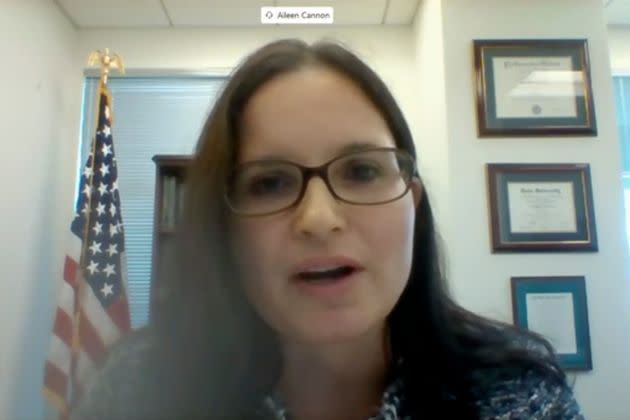How Judge Aileen Cannon Could Help Trump In His Documents Trial
- Oops!Something went wrong.Please try again later.
- Oops!Something went wrong.Please try again later.
Aileen Cannon, the U.S. district judge appointed to oversee former President Donald Trump’s trial over his handling of classified documents, faces heavy scrutiny after her previous decision favoring Trump in a related case was overturned and found to be riddled with errors.
Democrats in Congress have called for Cannon to recuse herself from overseeing the case against the former president on 37 felony counts, which include mishandling classified documents, obstruction and making false statements, because of her previous favorable disposition toward him.
“I’m very concerned about her prior rulings and her potential mindset in this case,” said Sen. Richard Blumenthal (D-Conn.), a member of the Senate Judiciary Committee. “In the interests of justice, she might well consider recusing herself.”
“The standard ... is whether it would cause a reasonable person to question the integrity and impartiality of the proceedings, and I think she has come very close to completely discrediting her own potential impartiality and objectivity with respect to Donald Trump, so that would be the wiser way for her to go, but obviously that’s up to her,” said Rep. Jamie Raskin (D-Md.), the ranking member on the House Oversight and Accountability Committee.

In this video image provided by the Senate Judiciary Committee, Aileen Cannon testifies virtually during her nomination hearing on July 29, 2020. She was nominated by President Donald Trump to the U.S. District Court for the Southern District of Florida, with her confirmation coming a week after Trump lost the presidential election.
Senate Judiciary Committee chair Dick Durbin (D-Ill.) said he was “concerned” about her selection as the trial judge for this case but hopes “that she really does her very best to be neutral and a good judge.”
Trump was arraigned at a Miami federal courtroom on Tuesday and pleaded not guilty to all charges against him.
Cannon, one of the youngest and least experienced federal judges, was nominated by Trump for the U.S. District Court seat in 2020 and confirmed a few days after Trump lost the election. She came into the spotlight in September 2022 after she released an opinion that temporarily suspended the investigation into Trump’s possession of classified documents following an FBI search of his residence at the Mar-a-Lago private club in Florida. Her opinion ordered investigators not use the seized classified documents until a special master appointed by her reviewed the documents, as Trump’s lawyers had requested.
In doing so, she declared that Trump, as a former president, faced “reputational harm” of a “decidedly different order of magnitude” than another person who faced a similar search, seizure and potential indictment. Trump is again seeking the presidency in the 2024 election.
A panel of two Trump nominees and one Barack Obama nominee on the U.S. Circuit Court for the 11th District overturned Cannon’s opinion in strong terms later in September. In repeatedly noting Cannon’s multiple errors and omissions, the court declared that “the district court abused its discretion in exercising jurisdiction over [Trump’s] motion as it concerns the classified documents.”
The strong rebuke revealed Cannon’s decision to be a sop to Trump. This is what tarnished her reputation as potentially biased in favor of the president who nominated her to the federal bench. And now, by random assignment, Cannon will have power to help Trump again. She was randomly assigned the case from a pool of five available judges within the U.S. District Court that hears cases in Miami-Dade and Palm Beach counties.
Her appointment produced a broad outcry from Democrats and legal observers across the political spectrum, who worried that her previous flawed decision after the Mar-a-Lago FBI search showed that she could not appear as an unbiased judge in another case involving Trump.
“Given the importance of this case, perhaps the most important criminal trial in the history of the United States — certainly the most watched — and in light of what Judge Cannon did in the search-and-seizure case last year, I think she must step aside,” Stephen Gillers, an expert on judicial ethics at the New York University School of Law, told The New Yorker.
“For a case as important as this one, it’s critical to have a judge who is experienced, smart, and impartial,” Michael Bromwich, a former Department of Justice inspector general and lawyer for the independent counsel in the Iran-Contra scandal of the late 1980s, tweeted. “Judge Cannon fails on each of these dimensions. If she has any self-awareness, she should recuse herself.”
This isn’t to say that she will be biased in her second go-around hearing arguments on Trump’s alleged illegal retention of classified documents.

Former President Donald Trump waves as he makes a visit to the Cuban restaurant Versailles in Miami after he pleaded not guilty to 37 federal charges on Tuesday.
“There is a need for caution in terms of people’s hyperbole regarding the likelihood that Judge Cannon will preside over this prosecution,” Bradley Moss, a lawyer who specializes in national security cases, said via email. “The earlier procedural matters before her were different in terms of nature (they were civil) and substance (it was only about a Special Master review).”
Still, the presiding judge in a trial like this one does have significant leeway to delay or derail a prosecution if they so desire.
There are questions of what evidence will be allowed to be admitted into court. Trump’s lawyers have already sought to strike testimony and evidence from Trump’ ex-lawyer Evan Corcoran as a violation of attorney-client privilege. They are also likely to challenge everything from the legality of the search warrant to the ability of Trump to hold the government documents in question under the Presidential Records Act.
In each instance, Cannon will be able to rule on what evidence can be admitted and whose testimony can be heard. If she sides with Trump, the prosecution can appeal, but that will create further delays as campaigning for the 2024 Republican presidential nomination is already underway.
Cannon can also influence the case during the jury selection process. Since trial judges have a lot of leeway to call out potential juror bias, Cannon could pack the jury with people who are sympathetic to Trump. With the jury needing to reach a unanimous verdict, even one biased juror could cause a mistrial.
Any and all of these decisions could be appealed by the prosecution. And evidence of favoritism toward Trump could lead to a later request for Cannon’s recusal.
“If she was acting out of the traditional bounds of what are very commonplace procedures, the 11th Circuit and the prosecutors would note it very quickly,” said Sen. Sheldon Whitehouse (D-R.I.), a member of the Senate Judiciary Committee.
Still, this all threatens to drag out the proceedings.
“While the odds are not in Mr. Trump’s favor on any of those issues, judges can be wild cards and there is always the possibility that the government will be forced to seek immediate appellate review of any adverse pre-trial rulings,” Moss said in an email. “If nothing more, that review could further delay the start of a trial and risk pushing it back until after the 2024 election.”
That works to Trump’s benefit. He wants to delay a verdict as long as possible because his indictment now stalls all other ongoing investigations. More important, he hopes that he can win the 2024 election and, once in the White House again, he would be protected from prosecution and could even attempt to pardon himself.
